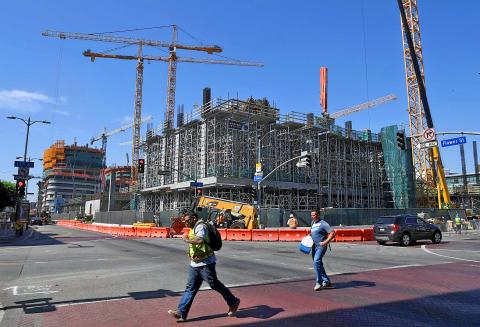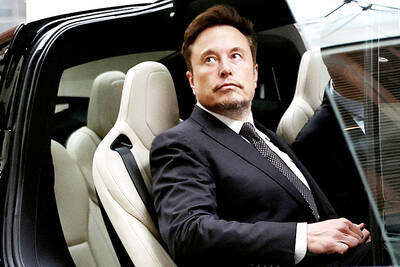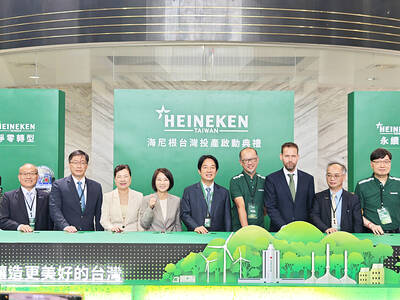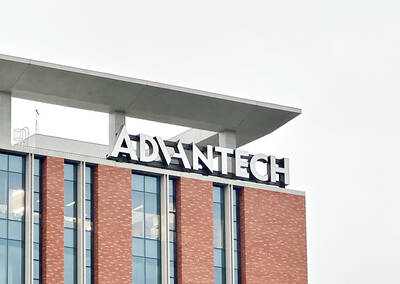From real estate to high-tech firms to entertainment giants, Chinese investments in the US, notably California, are moving at a dizzying pace and are on course to smash records again this year.
Chinese companies shelled out a record US$15 billion last year in the US and that figure could more than double this year, according to research firm Rhodium Group and the National Committee on US-China Relations.
California, especially the San Francisco Bay Area and Los Angeles, has been at the forefront of China’s appetite to invest overseas, with billions of dollars going into the technology, renewable energy and entertainment sectors, and increasingly into real estate.

Photo: AFP
China has pumped US$8 billion into California businesses since 2000, more than in any other state, a recent Rhodium Group study said.
It added that there were 452 Chinese-owned businesses that employed more than 9,500 people in the Golden State as of the end of last year, among them the online giant Alibaba Group Holding Ltd (阿里巴巴) and the Internet company Tencent Holdings Ltd (騰訊).
Cash is also flowing into Hollywood, with the Beijing-based Wanda Group (萬達集團) paying $3.5 billion earlier this year to acquire the film studio Legendary Pictures LLC, the largest-ever cultural takeover by China.
The buying spree is showing no signs of abating for the foreseeable future, experts say, despite tumult in China’s economy and mounting rhetoric during the US presidential campaign.
“Chinese investment in the US — and California in particular — will almost certainly multiply in the coming years,” said Matt Sheehan, who consults and writes about Chinese investment in the Golden State and whose forthcoming book is entitled Chinafornia.
While the political climate is not helping, cities across the US are welcoming Chinese investments with open arms, drowning out the campaign rhetoric and anti-China sentiment in Congress.
“If the domestic Chinese economy continues to boom, firms will have the loose cash to make strategic investments and vanity purchases abroad,” Sheehan said. “If the Chinese economy and RMB [renminbi] currency go into a nosedive, you’ll likely see a large capital flight disguised as overseas investment.”
One sector increasingly on the Chinese shopping list in the US is real estate, with buyers snapping up expensive homes and high-end commercial properties at a record pace. Chinese investors pumped nearly US$11 billion into US real estate in the first five months of this year, outpacing last year’s total of US$4.37 billion, according to a report by real estate firm Cushman & Wakefield.
The west coast has proven a major draw. Of the four mega development projects currently underway in Los Angeles, three are by Chinese firms, including a US$1 billion condominium and hotel development by Beijing-based Oceanwide Holdings Group Co (中泛控股) and a similar project — Metropolis — by Shanghai-based Greenland Holding Group (綠地控股集團).
Once completed in 2018, Metropolis will be the largest mixed-use complex on the west coast.
In San Francisco, Oceanwide has acquired land that will house the city’s second-tallest tower and several other Chinese-backed developments are on the books.
Residential property is also part of the buying frenzy, with sales more than doubling in the past three years.
“In 2016, we had US$27.3 billion in volume of sales to Chinese buyers compared to US$7 to US$13 billion up until 2013,” said Danielle Hale, an analyst with the National Association of Realtors.

purpose: Tesla’s CEO sought to meet senior Chinese officials to discuss the rollout of its ‘full self-driving’ software in China and approval to transfer data they had collected Tesla Inc CEO Elon Musk arrived in Beijing yesterday on an unannounced visit, where he is expected to meet senior officials to discuss the rollout of "full self-driving" (FSD) software and permission to transfer data overseas, according to a person with knowledge of the matter. Chinese state media reported that he met Premier Li Qiang (李強) in Beijing, during which Li told Musk that Tesla's development in China could be regarded as a successful example of US-China economic and trade cooperation. Musk confirmed his meeting with the premier yesterday with a post on social media platform X. "Honored to meet with Premier Li

Dutch brewing company Heineken NV on Friday announced an investment of NT$13.5 billion (US$414.62 million) over the next five years in Taiwan. The first multinational brewing company to operate in Taiwan, Heineken made the statement at a ceremony held at its brewery in Pingtung County. It also outlined its efforts to make the brewery “net zero” by 2030. Heineken has been in the Taiwanese market for 20 years, Heineken Taiwan managing director Jeff Wu (吳建甫) said. With strong support from local consumers, the Dutch brewery decided to transition from sales to manufacturing in the country, Wu said. Heineken assumed majority ownership and management rights

coverage expansion: The industrial PC maker has proposed to acquire 3.938 million Aures shares to strengthen its global smart retail presence Leading industrial PC maker Advantech Co (研華) plans to acquire Aures Technologies SA, a French company known for its point-of-sale (POS) and kiosk equipment, to expand its global coverage in smart retail products and services. Advantech proposed to acquire 3.938 million Aures shares from the French firm’s major shareholder and through a public tender offer at up to 6.7 euros per share, the PC maker said in a statement after announcing the deal at the Taiwan Stock Exchange late on Friday. The company aims to acquire up to 100 percent equity of Aures, a well-known brand in the western market with a

Microsoft Corp yesterday said that it would create Thailand’s first data center region to boost cloud and artificial intelligence (AI) infrastructure, promising AI training to more than 100,000 people to develop tech. Bangkok is a key economic player in Southeast Asia, but it has lagged behind Indonesia and Singapore when it comes to the tech industry. Thailand has an “incredible opportunity to build a digital-first, AI-powered future,” Microsoft chairman and chief executive officer Satya Nadella said at an event in Bangkok. Data center regions are physical locations that store computing infrastructure, allowing secure and reliable access to cloud platforms. The global embrace of AI